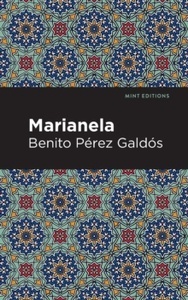Marianela

Editorial Graphic Arts Books
Fecha de edición septiembre 2021 · Edición nº 1
Idioma inglés
EAN 9781513290935
140 páginas
Libro
encuadernado en tapa blanda
Resumen del libro
Marianela (1878) is a novel by Benito Perez Galdos. Published toward the beginning of Perez Galdos' career, Marianela is a powerful story of romance and disability that raises timeless questions regarding the meaning of love and the values associated with beauty. Adapted several times for film and television in Spain and abroad, the novel is Perez Galdos' most universal works of fiction.
Everyone is familiar with the phrase "love at first sight," but what about "love at first song?" In Marianela, Benito Perez Galdos explores the ways we understand love in relation to worldly beauty. His contemporary fable is set in the fictional town of Socartes, where a young orphan named Marianela captures the heart of the blind youth Pablo through her beautiful singing. Their love is pure, and they plan to marry, but Pablo's father has other plans.
Hiring the famous doctor Teodoro Golfin to restore his son's eyesight, he unwittingly threatens the unique relationship between Pablo and Marianela, whose physical features are far from society's ideal. Although he promises to love her forever, Pablo feels pressured to marry his cousin Florentina. With a beautifully designed cover and professionally typeset manuscript, this edition of Benito Perez Galdos's Marianela is a classic of Spanish literature reimagined for modern readers
Biografía del autor
Benito Pérez Galdós nació en Gran Canaria en 1843. Con veinte años viajó por Europa como corresponsal y a la vuelta tradujo a Dickens a partir de las ediciones francesas. En 1873 empezó a publicar los Episodios Nacionales, obra que le granjeó una inmensa popularidad y que continuaría escribiendo a lo largo de cinco series y a la par que novelas como Fortunata y Jacinta (1887), Miau (1888), Tristana (1892), Misericordia (1897), El abuelo (1897), Casandra (1905), El caballero encantado (1909; Nocturna, 2024) y La razón de la sinrazón (1915). En 1897 fue nombrado miembro de la Real Academia de la Lengua Española. Colaboró con diversos medios de comunicación y perteneció al Partido Progresista de Sagasta, al Partido Republicano y a la Conjunción Republicano-Socialista (con este último, fue diputado en las Cortes en las legislaturas de 1907 y 1910). En 1912 fue propuesto para el Premio Nobel de Literatura y un año después se quedó ciego. Murió en Madrid en 1920.








